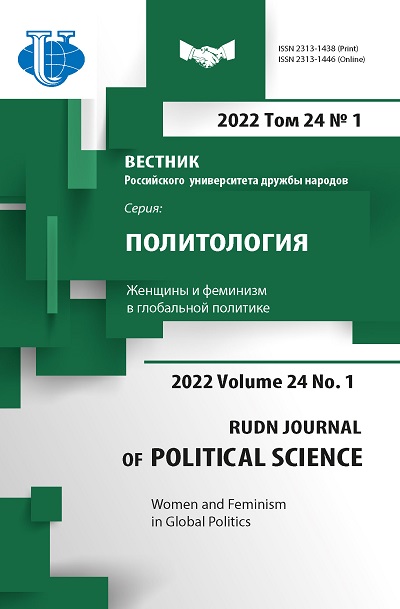Career Barriers in Ghana: Evidence from Female Civil Servants
- 作者: Utkina V.V.1, Efimova A.V.1
-
隶属关系:
- National Research University Higher School of Economics
- 期: 卷 24, 编号 1 (2022): Women and Feminism in Global Politics
- 页面: 166-174
- 栏目: REGIONAL COOPERATION AND INTEGRATION
- URL: https://journal-vniispk.ru/2313-1438/article/view/322597
- DOI: https://doi.org/10.22363/2313-1438-2022-24-1-166-174
- ID: 322597
如何引用文章
全文:
详细
Ghanaian civil service is a classic example of a “gender pyramid” where top positions tend to be occupied by men, while women (more than 50%) face gender discrimination. Gender stereotypes about women are a major barrier to women’s career advancement in Ghanaian civil service. Based on a series of in-depth interviews with women in the Ghanaian public authorities, we identified the main problems women face in the Ghanaian civil service, such as patriarchal practices, gender discrimination, and harassment, including sexual harassment. Our study aims to show the practitioners why it is hardly possible to call public service a “comfortable job” for women in Ghana.
作者简介
Valeriya Utkina
National Research University Higher School of Economics
编辑信件的主要联系方式.
Email: valeria_utkina@hotmail.com
ORCID iD: 0000-0003-0012-1999
Senior Lecturer, Faculty of Social Sciences
Moscow, Russian FederationAlina Efimova
National Research University Higher School of Economics
Email: alina63efimova@gmail.com
ORCID iD: 0000-0001-5527-4883
master student of the Program “Comparative Social Research”
Moscow, Russian Federation参考
- Acheampong, E.O., & Dinye, R.D. (2015). Women and local governance in developing countries: A case study of Ejisu, Ghana. International Journal of Public Administration, 38(3), 200-215.
- Adusah-Karikari, A., & Akuokos, T. (2010). Gender mainstreaming in Ghana’s public sector: Myth or reality, The International Journal of Diversity in Organisations, Communities and Nations, 10(4), 95-111.
- Adusah-Karikari, A., & Ohemeng, F.L.K. (2014). Representative bureaucracy in the public service? A critical analysis of the challenges confronting women in the civil service of Ghana. International Journal of Public Administration, 37(9), 568-580.
- Agbaje, F.I. (2019). Colonialism and Gender in Africa. In O. Yacob-Haliso & T. Falola (Eds.), The Palgrave Handbook of African Women’s Studies. Palgrave Macmillan, Cham. https://doi.org/10.1007/978-3-319-77030-7_3-1
- Aidoo, E., & Achira, D.C. (2016). Factors that influence the glass ceiling. Evidence from the Formal Sector Organization. British Journal of Economics, Management and Trade, 12(1), 1-13, Article no. BJEMT.22729
- Bawa, S., & Sanyare, F. (2013). Women’s participation and representation in politics: Perspectives from Ghana. International Journal of Public Administration, 36(4), 282-291.
- Dowuona-Hammond, C., Atuguba, R.A., & Tuokuu, F.X.D. (2020). Women’s Survival in Ghana: What Has Law Got to Do With It? SAGE Open. https://doi.org/10.1177/2158244020941472
- Manuh, T., & Anyidoho, N.A. (2015). ‘To Beijing and back’: reflections on the influence of the Beijing Conference on popular notions of women’s empowerment in Ghana, IDS Bulletin, 46(4), 19-27.
- Tagoe, M., & Abakah, E. (2015). Issues of Women’s Political Participation and Decision-Making in Local Governance: Perspectives from the Central Region of Ghana. International Journal of Public Administration, 38(5), 371-380.
- Tamale, S. (2000). ‘Point of Order, Mr. Speaker’: African Women Claiming Their Space in Parliament. Gender and Development, 8(3), 8-15.
- Utkina, V. (2018). Gender and Governance, Russia. In Global Encyclopedia of Public Administration, Public Policy and Governance (pp. 1-7). Cham: Springer.
补充文件








